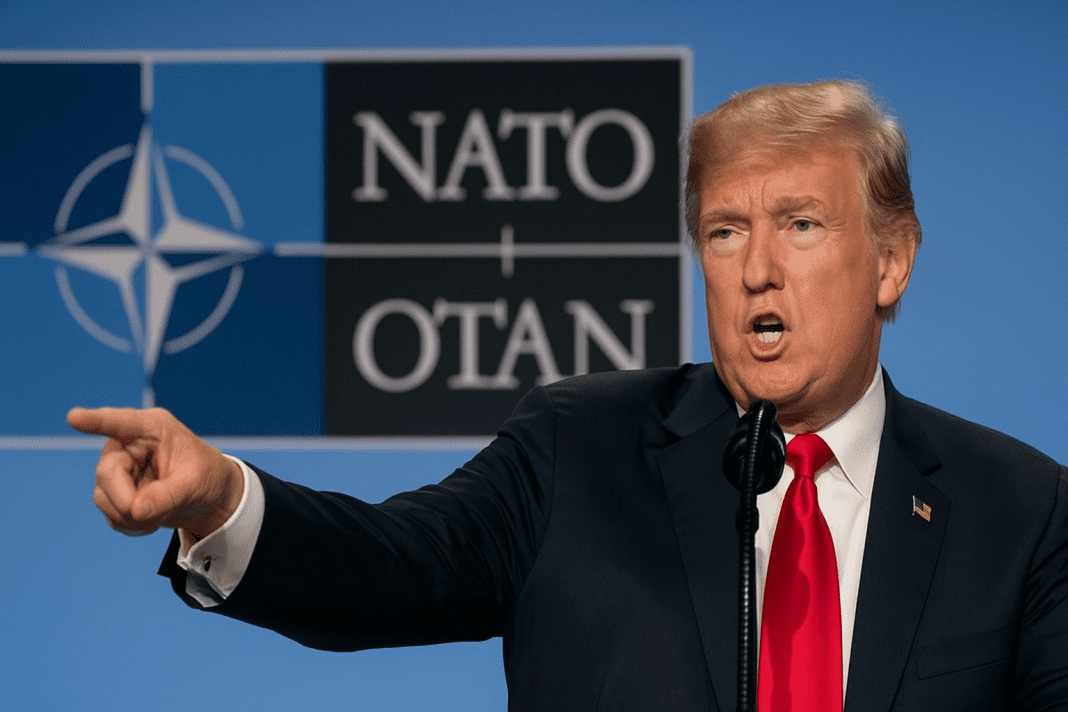US President Donald Trump has said that the United States would defend Poland and the Baltic states if Russia launched an attack in the future. His comments came after reporters directly asked whether Washington would come to the aid of NATO members in case Moscow escalated its actions. Trump answered simply: “Yeah I would.”
Trump’s Statement on NATO Defense and Baltic States
These remarks arrive at a tense moment in Europe. In recent weeks, Russian drones and fighter jets have entered the airspace of several NATO countries, including Estonia, Poland, and Romania. Western governments have described such incursions as violations of international norms and have widely condemned them.
NATO’s Article 5 requires all member states to defend each other. If Russia attacked any one member, the US and other NATO allies would treat it as an attack against the entire alliance. Trump’s assurance that the US would step in directly ties to this principle and reassures Poland and the Baltic states.
Just days earlier, Trump warned that Moscow’s actions could spell “big trouble.” He expressed growing frustration over repeated Russian provocations but has not yet laid out a detailed plan for how to respond to them.
✅ Zakharova strikes back — Russia links NATO policy to historic Baltic stand-off
Rising Tensions for Poland and Baltic States
Estonia reported that three Russian MiG-31 fighter jets violated its airspace on Friday, remaining there for about 12 minutes before pulling back. Tallinn described the incident as “unprecedentedly brazen.” NATO jets stationed in the region reportedly intercepted the Russian aircraft. Estonia, one of the Baltic states, has now requested consultations with its allies under Article 4 of the NATO treaty, which allows members to meet when they feel threatened.
This is not an isolated case. Earlier this month, more than 20 Russian drones crossed into Polish airspace during a single night between September 9 and 10. NATO fighter jets shot down some of those drones, but the incident raised alarms about Russia’s intentions. Observers also reported similar incidents in Romanian skies, which heightened worries for both Poland and the Baltic states.
Czech president Petr Pavel has taken an especially strong stance, arguing that NATO forces must be ready to shoot down Russian jets if necessary. His comments reflect the growing impatience among some European leaders as Russia continues to test NATO’s response with repeated airspace violations around the Baltic states.
Meanwhile, the United Nations Security Council is expected to meet over Estonia’s accusations against Moscow. Russia has denied the charges, claiming its jets flew only over neutral waters. Despite these denials, radar and visual evidence provided by Estonia points to a clear breach, again putting Poland and the Baltic states in the spotlight.
Lithuania Cuts Russian Power Ties: Baltic States Move Towards EU Integration
Nuclear Rhetoric, Security Guarantees, and the Baltic States
Adding to the heated environment, retired US General Keith Kellogg, who is serving as Trump’s special envoy for Ukraine, made striking comments about nuclear deterrence. In an interview, Kellogg claimed that Russian President Vladimir Putin would “fold” if leaders raised the stakes of a nuclear standoff.
He cited a past example of Trump’s exchange with North Korean leader Kim Jong Un. When North Korea boasted that it was a nuclear power, Trump reportedly responded, “So am I. I’ve got a red button too. It’s bigger than yours and mine works better.” Kellogg said the same strategy of showing strength could apply to Putin, whom he described as a manipulator with a KGB background.
Kellogg argued that the only effective response to Putin is “strength, power, and force.” He accused the Russian leader of pretending not to understand the West, even though he speaks English. His statements underline Washington’s tough rhetoric against Moscow as tensions rise, particularly for the Baltic states that face repeated airspace violations.
At the same time, Ukrainian President Volodymyr Zelensky has said that Ukraine and its allies have prepared the groundwork for long-term security guarantees. Speaking ahead of meetings at the UN General Assembly in New York, Zelensky explained that he would use the discussions to see how close they were to finalizing such commitments. He emphasized that sanctions against Russia must remain in place if peace talks fail to progress.
Zelensky added that European partners were willing to move forward on security guarantees, but only if the United States stayed fully engaged. He confirmed that these talks involved not only diplomats but also military leaders from both sides of the Atlantic, which has major importance for Poland and the Baltic states given their frontline position against Russian provocations.
A Flurry of Incidents Inside Russia and Crimea
While NATO deals with airspace violations, Russia itself has been hit by strikes linked to the ongoing war. In southern Russia’s Krasnodar region, debris from Ukrainian drones sparked a fire at an electricity substation in the town of Staraoderevyankovskaya. Emergency services reported no injuries, and crews quickly moved in to contain the flames.
Countdown to Conflict? Russia’s Latest Threat Sparks Escalation Fears in Poland and the Baltics
In Crimea, Russia accused Ukraine of carrying out what it called a “premeditated terrorist attack” on a resort area in Faros. Moscow claimed that Ukrainian drones, carrying high-explosive payloads, killed three people and injured at least 16 more. According to reports, some senior Russian officials may have been staying in guest houses near the strike location.
Russian officials have blamed both Ukraine and NATO for the incident, accusing them of destabilizing Europe. Moscow’s foreign ministry spokesperson Maria Zakharova said that Western support for Kyiv was directly fueling terrorism on the continent.
Meanwhile, Russia’s Belgorod region has also seen casualties. Regional officials reported that two civilians were killed and four others injured in Ukrainian attacks. One woman died when a shell hit her home in Shebekino, and another man was killed in a drone strike in Rakitnoe.

